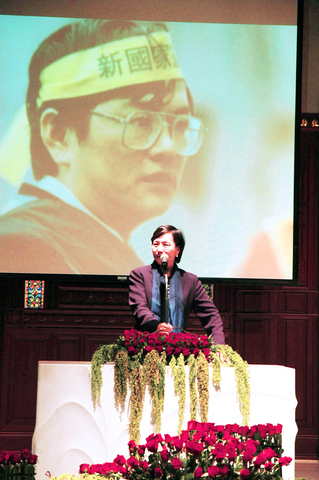Loved ones and democracy activists gathered yesterday to pay tribute to Deng Nan-jung (
"My heart aches. No matter how strong I want to be ... tears still run like water down my face," said Yeh Chu-lan (葉菊蘭), Deng's widow and former acting Kao-hsiung mayor at a commemorative event hosted by the Deng Liberty Foundation (鄭南榕基金會) at Chinpaoshan Cemetery (金寶山) in Taipei County.
On April 7, 1989, Deng, then editor-in-chief of Freedom Era Weekly (

PHOTO: CNA
Among the more than 100 people attended the ceremony was Democratic Progressive Party (DPP) Chairman Yu Shyi-kun.
Questioning whether Taiwanese trust the nation's political parties, government, politicians and media, Yu said that Deng's self-immolation was the result of his being true to his belief in democracy.
Yu added that as Taiwan searches for a new Taiwanese democracy, Deng's example helped people believe, stay true to their word and behave in an upright manner, which Yu said was the kind of person Taiwan required today.
Yeh thanked everyone for attending the service and said that Deng had made her feel their family was the proudest and happiest one in Taiwan.
Yeh added that while Taiwan had left the white terror behind over the past 18 years to become a country that enjoys freedom of expression, it is also necessary to consider the responsibilities that this freedom implies.
Born in Taiwan in 1947 to a Chinese father, Deng publicly argued for Taiwan independence on numerous occasions during the 1980s -- a time when vocal supporters of independence were often charged with sedition.
"I am the child of a mainlander and I advocate Taiwan independence," he once said.
After failing to win his philosophy diploma from National Taiwan University because he refused to take courses on the philosophies of Sun Yat-sen (
A follower of liberalism, Deng held a deep belief in freedom of expression and established Freedom Era Weekly in 1984 in pursuit of what he called "100 percent freedom of expression."
To prevent the magazine from being banned or suspended by the Chinese Nationalist Party (KMT) regime, Deng registered licenses under 18 different names such as "a spare tire."
The magazine lasted five years and eight months and finally closed six months after Deng's death.
The magazine achieved fame in the 1980s, when the country was under martial law, for its reports on the KMT's corrupt practices and articles that challenged the authority of late president Chiang Ching-kuo (
As a result of its outspokenness, the magazine broke the record for the number of times a publication had been banned or suspended.
Yesterday's ceremony ended with Reverend Kao Chun-ming (

An essay competition jointly organized by a local writing society and a publisher affiliated with the Chinese Communist Party (CCP) might have contravened the Act Governing Relations Between the People of the Taiwan Area and the Mainland Area (臺灣地區與大陸地區人民關係條例), the Mainland Affairs Council (MAC) said on Thursday. “In this case, the partner organization is clearly an agency under the CCP’s Fujian Provincial Committee,” MAC Deputy Minister and spokesperson Liang Wen-chieh (梁文傑) said at a news briefing in Taipei. “It also involves bringing Taiwanese students to China with all-expenses-paid arrangements to attend award ceremonies and camps,” Liang said. Those two “characteristics” are typically sufficient

A magnitude 5.9 earthquake that struck about 33km off the coast of Hualien City was the "main shock" in a series of quakes in the area, with aftershocks expected over the next three days, the Central Weather Administration (CWA) said yesterday. Prior to the magnitude 5.9 quake shaking most of Taiwan at 6:53pm yesterday, six other earthquakes stronger than a magnitude of 4, starting with a magnitude 5.5 quake at 6:09pm, occurred in the area. CWA Seismological Center Director Wu Chien-fu (吳健富) confirmed that the quakes were all part of the same series and that the magnitude 5.5 temblor was

The brilliant blue waters, thick foliage and bucolic atmosphere on this seemingly idyllic archipelago deep in the Pacific Ocean belie the key role it now plays in a titanic geopolitical struggle. Palau is again on the front line as China, and the US and its allies prepare their forces in an intensifying contest for control over the Asia-Pacific region. The democratic nation of just 17,000 people hosts US-controlled airstrips and soon-to-be-completed radar installations that the US military describes as “critical” to monitoring vast swathes of water and airspace. It is also a key piece of the second island chain, a string of

The Central Weather Administration has issued a heat alert for southeastern Taiwan, warning of temperatures as high as 36°C today, while alerting some coastal areas of strong winds later in the day. Kaohsiung’s Neimen District (內門) and Pingtung County’s Neipu Township (內埔) are under an orange heat alert, which warns of temperatures as high as 36°C for three consecutive days, the CWA said, citing southwest winds. The heat would also extend to Tainan’s Nansi (楠西) and Yujing (玉井) districts, as well as Pingtung’s Gaoshu (高樹), Yanpu (鹽埔) and Majia (瑪家) townships, it said, forecasting highs of up to 36°C in those areas